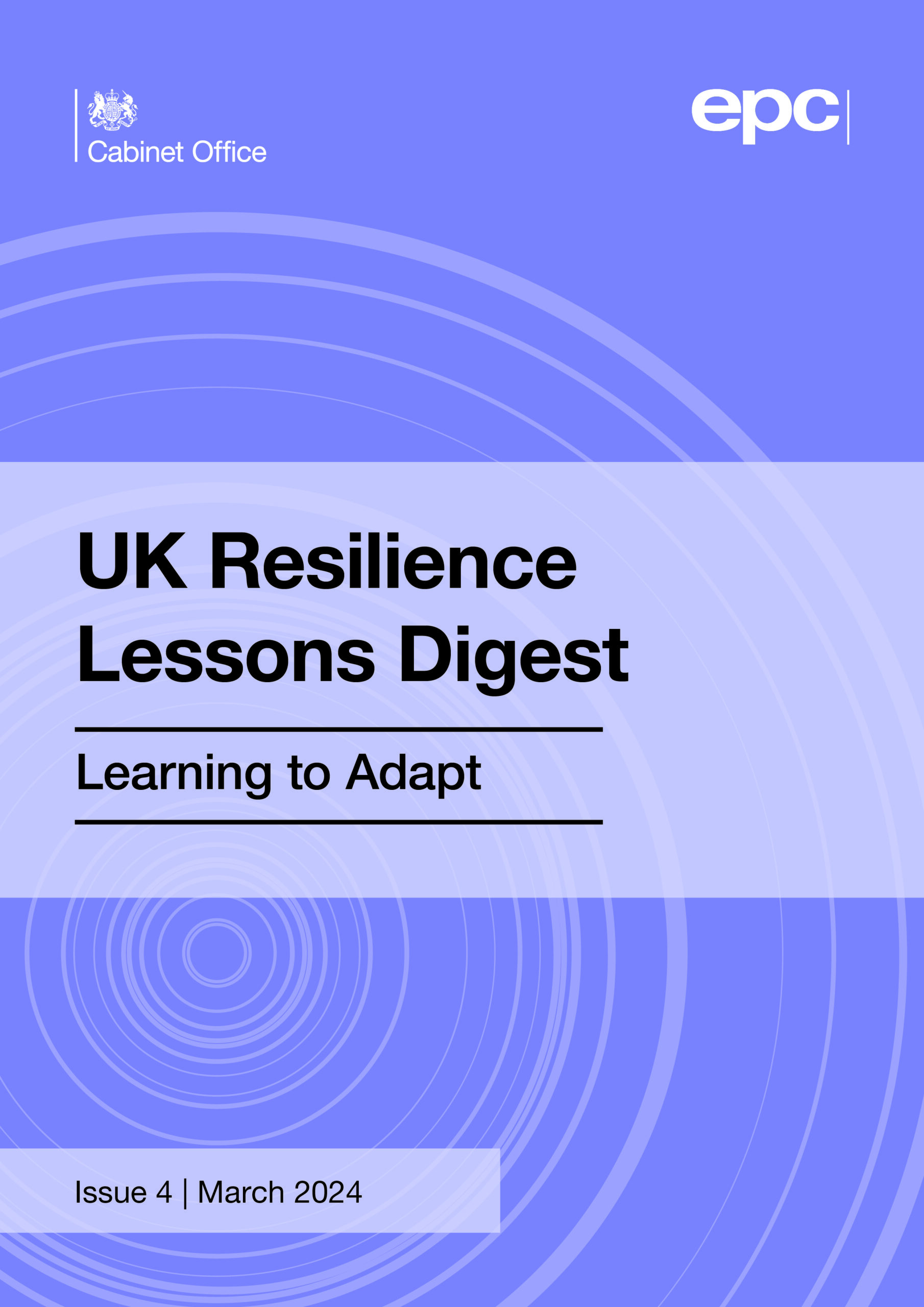
The fourth edition of the UK Resilience Lessons Digest, ‘Learning to Adapt’ has been published on the Cabinet Office Emergency Planning College (EPC) website. Released on 27th March 2024, this latest Digest continues a series of publications produced as part of a programme of work at EPC, to synthesise lessons learned of all major exercises and emergencies. The publication is released in line with the commitment in the UK Government Resilience Framework to summarise lessons from a wide range of relevant sources, share insights consistently across the UK Government and wider partners, and coordinate knowledge to promote continual improvements in UK resilience.
‘Learning to Adapt’ was prepared in response to impacts associated with the climate emergency. It focuses on the crucial role that climate adaptation action plays in limiting the impacts of our changing climate, such as increased flooding, and in building a climate resilient future.
Upon its release Lianna Roast, Head of Thought Leadership at EPC, said:
‘Climate research is clear that urgent adaptation action is needed to build resilience to the current and future impacts of climate change. It’s not a substitute for vital mitigation efforts, like the commitment to Net Zero. On the contrary, we know that mitigation and adaptation are essential partners in the resilience-building process. With salient impacts like extreme weather events and the risk of feasible adaptation options reducing as global temperatures rise, learning from existing adaptation action is essential.
While there is always further to go, concerted climate adaptation efforts and examples of effective policy and practice are available at international, national, and local levels. This means that shared learning could help accelerate and multiply positive, effective climate adaptation progress. Crucially, lessons identified could also prevent the proliferation of practices associated with negative, maladaptive outcomes, and promote problem solving responses to commonly experienced barriers in adaptation action.’
To support that shared learning, the Digest publication presents a summary of learning themes and a range of transferable lessons on climate adaptation for the resilience community. These were identified from 278 lessons, recommendations, and findings across twelve reports. The five most prominent learning themes highlighted some key barriers and enablers of effective climate adaptation action in their respective areas. These included:
- Integrated governance
- Monitoring and evaluation
- Stakeholder engagement
- Economic challenges
- Practical project planning and delivery
Reflecting on the analysis Lianna added:
‘In comparison to lessons analysed in previous Digests, lessons on climate adaptation stood out as notably diverse, dynamic and interconnected. This likely mirrors the nature of the climate challenge, but the analytical approach did have to adapt slightly to accommodate it. Lessons spread over diverse policy drivers, programmes, contexts, and sector specific solutions increased the initial scoping requirement. The diverse presentation of lessons spanning complex, technical climate reports and rich, locally contextualised case studies increased variability across reports. Finally, the interconnected nature of the lessons meant that the analysis was additionally involved, given that they sometimes aligned across multiple thematic learning areas. It was a pertinent reminder of how influential the nature of the challenge can be in shaping the lessons we identify in relation to it.
The effects and impacts of the climate emergency are simultaneously global and local, generalisable yet relative, and experienced both universally and uniquely. It appears this has yielded climate adaptation lessons as diverse, interconnected, and as unevenly and unequally distributed as the effects and impacts of climate change itself. This impresses the importance of generating shared learning opportunities across multiple stakeholders, sectors and diverse contexts, to drive the transfer of learning on climate adaptation forward and leverage its value in action.’
Further details of the analysis and findings, along with guest articles from: the Met Office; Bournemouth University Disaster Management Centre; Emergency Planning College and Local Partnerships, can be found in the ‘Learning to Adapt’ publication.
